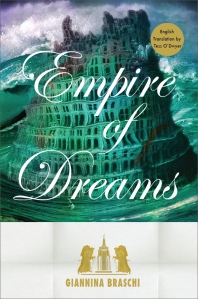
Saturday, January 5, 2013 in Boston
Modern Language Association Convention
SPECIAL EVENT! A Dramatic Reading by Giannina Braschi, UNITED STATES OF BANANA @ 7:00–8:15 p.m., 206, Hynes Center, Boston
Hailed “The Wasteland of the 21st Century” by The Evergreen Review, Giannina Braschi’s revolutionary new work United States of Banana is the subject of a dramatic performance and a scholarly panel at the Modern Language Association’s annual convention. Braschi is the author of the postmodern poetry classic Empire of Dreams and the bestselling Spanglish novel Yo-Yo Boing! These titles form a mixed-genre trilogy on the subject of the American immigrant. A 7pm performance by the author in the John B. Hynes Veterans Memorial Center, follows a scholarly panel earlier in the day by Arnaldo Cruz-Malavé, Maritza Stanchich, and Cristina Garrigós entitled “Giannina Braschi’s United States of Banana: Revolutionary in Subject and Form” (12:00 noon–1:15 p.m., Back Bay C, Sheraton Hotel). Tess O’Dwyer, who translated Empire of Dreams and Yo-Yo Boing! from Spanish into English, serves as moderator.
“Giannina Braschi’s United States of Banana: Revolutionary in Subject and Form”, A Scholarly Panel @ 12:00 noon–1:15 p.m., Back Bay C, Sheraton Hotel
ABSTRACTS:
“Under the Skirt of Liberty: Giannina Braschi Rewrites Empire” by Arnaldo Cruz-Malavé (Fordham University)
Description:
For the last two decades discourses on empire have been the province of postcolonial diasporic critics. Writing from the vantage point of exile or diaspora, postcolonial critics, such as Said, Spivak, Bhabha, and Glissant, have meditated on questions of power and resistance in the relationship between former colonies and their metropolitan imperial centers in the current postcolonial world. More recently Hardt and Negri have extended this meditation to the contemporary global economic system. In her latest book, United States of Banana, New York Puerto Rican writer Giannina Braschi joins this meditation on agency and resistance but not from the vantage point of postcolonial exile but from that of colonial diasporas, such as the New York Puerto Rican community. Using 911 and the current economic crisis as a catalyst for her critique, Braschi extends her previous dialogue with high modernism in her Empire of Dreams, to discourses on postcoloniality and globalization. In my paper I will draw out the lines of this critique of postcoloniality and globalization from the vantage point of colonial diasporic subjectivity in the center of high modernism and postmodernism: New York.
Biographical Note:
Arnaldo Cruz-Malavé is Professor of Spanish and Comparative Literature and Chair of the Department of Modern Languages and Literatures at Fordham University in New York. His most recent book is Queer Latino Testimonio, Keith Haring, and Juanito Xtravaganza: Hard Tails (Palgrave 2007), a book about the relationship between high art and Latino popular culture in the gentrifying New York of the 1980s. He is also author of a study on the intersections of nationalism and sexuality in the prose fiction of the Cuban author, José Lezama Lima, El primitivo implorante, and coeditor, with Martin Manalansan, of Queer Globalization: Citizenship and the Afterlife of Colonialism (New York UP 2002). He has published widely on Hispanic Caribbean and U.S. Latino literatures and cultures. His essays have appeared in anthologies such as Entiendes? Queer Readings/Hispanic Writings (Duke 1995), Sex and Sexuality in Latin America (NYU 1997), and Queer Representations (NYU 1997), and in journals such as Revista Iberoamericana, differences, Revista de Crítica Cultural, Cuban Studies, and Centro: The Journal of the Center for Puerto Rican Studies.
******************************************************
“Whose English is it Anyway? Giannina Braschi Levels the Bilingual Playing Field” by Maritza Stanchich (University of Puerto Rico, Río Piedras)
Description
Giannina Braschi’s highly anticipated new novel The United States of Banana (2011), in line of flight from her groundbreaking quasi-novel Yo-Yo Boing! (1998), marks a paradigmatic shift in the millennial poetics of witness of Whitman and Martí’s New York with a high/low transcanonical, inter and transAmerican postmodern performance that levels the playing field to bring parity to the charged terrain of English/Spanish bilingualism. In Banana, Braschi proposes simultaneously post modern and protest poetics in dizzying global/local contexts, as U.S. global hegemony declines post 9/11, as the United States has fast become the second largest Spanish speaking country in the world, and as its colony Puerto Rico faces a historic crisis only deepened under local annexationist leadership. In both works, Braschi’s vanguard bilingual performance breaks with previous theorizations of the functions of interlingualism in diasporic Puerto Rican and Chicano theory (Juan Bruce-Novoa 1990; Juan Flores and George Yúdice 1990; Frances Aparicio 1988, 1997), as well as with Puerto Rico’s insular cultural nationalist linguistic discourses. In doing so, Braschi challenges a transimperial history of global power relations between English and Spanish (Mignolo 2000) with literary language that exceeds canonical traditions. Braschi also brings to the fore a vein of avant-garde literature of the Puerto Rican diaspora, along with the distinct projects of Urayoán Noel, Lawrence La Fountain-Stokes, and the late Edgardo Vega Yunqué, as well as what I elsewhere call Post-Nuyorican literature, along with poets who uniquely venture into broadly comparative and international terrains, including Victor Hernández Cruz, whose most recent work explores Arabic and African linguistic influences in Spain, and Martín Espada, whose work straddles pan-Latino, trans-American literary traditions, engaging Latin American history as well as a global poetics of dissent.
Biographical Note

Maritza Stanchich, PhD, is an Academic Senator and Associate Professor of English for the College of Humanities at University of Puerto Rico, Río Piedras, where she teaches Caribbean, U.S., and U.S. Latina/o Literatures. Her scholarship on literature of the Puerto Rican diaspora and William Faulkner has appeared in Sargasso and Mississippi Quarterly, respectively. She has also published in Prospero’s Isles: The Presence of the Caribbean in the American Imaginary (2004), Writing Of(f) the Hyphen: New Critical Perspectives on the Literature of the Puerto Rican Diaspora (2008), and Hispanic Caribbean Literature of Migration: Narratives of Displacement (2010). She previously worked as an award-winning journalist in New York, Washington DC, and San Juan. Her recent columns for The Huffington Post and The New York Times have helped bring international attention to the crisis in Puerto Rico. She has also worked for academic unionization at University of California and with the Puerto Rican Association of University Professors (APPU).
******************************************************
“Breaking the Borders: Giannina Braschi’s United States of Banana” by Cristina Garrigós, Universidad de León, Spain
Description
Giannina Braschi’s last novel, United States of Banana, combines characters from her previous works, such as Mariquita Samper, Giannina, and even the Statue of Liberty, that appear now interacting with Calderon’s Segismundo, Shakespeare’s Hamlet and Nietzsche’s Zarathustra. This makes it possible to read Braschi’s oeuvre as a whole and to observe in her writing a tendency towards continuity instead of rupture that is carried out in different levels. In a literary level, besides the intertextual inner and outer references, the book conveys a fragmentary discourse, through an aesthetic that defies the boundaries of the poetic, the dramatic, and the non-fiction essay. In this sense, it would fit into what Don De Lillo calls a “counter-narrative” (“In the Ruins of the Future”). Apocalyptic and deeply philosophical, Braschi’s text offers a reflection on the role of the human being, specifically, the latino writer in a global context where political, economical, social and linguistic boundaries are also questioned and erased, as epitomized by the relationship of Puerto Rico with the United States, and the destruction of the World Trade Center. In this sense, my paper will analyze the fluidity of borders in her text in the different aspects mentioned above.
Biographical Note
 Cristina Garrigós is Associate Professor at the University of Leon in Spain. She has a Ph.D. in English from the University of Seville (1999) with a dissertation on the intertextuality in the work of John Barth, and an M.A. in Comparative Literature from the University of North Carolina at Chapel Hill. She has taught at Universidad Autonoma de Madrid, Universidad de Leon, and Texas A&M International University. Her research interests include Postmodernism, Feminism, Literary and Film Theory, Bilingualism, and Borders. She wrote the book Un autor en busca de cuatro personajes: Ulises, Sherezade, Don Quijote y Huckleberry Finn en la obra de John Barth (University of Leon, Spain, 2000), and served as editor of La mujer quijote (Charlotte Lennox’s The Female Quixote, Spanish Edition, 2004) and El 11 de Septiembre y la tradición disidente en Estados Unidos (University of Valencia, 2011). She published the interview entitled “Chicken with the Head Off: Una conversación con Giannina Braschi” (Voices of America/Voces de America. Alonso Gallo, Laura, Ed. Cádiz: Aduana Vieja, 2004), as well as the article “Bilingues, biculturales y Postmodernas: Rosario Ferré y Giannina Braschi” (Insula. 667-668 Las Otras Orillas del Español: Las Literaturas Hispánicas de los Estados Unidos, 2002).
Cristina Garrigós is Associate Professor at the University of Leon in Spain. She has a Ph.D. in English from the University of Seville (1999) with a dissertation on the intertextuality in the work of John Barth, and an M.A. in Comparative Literature from the University of North Carolina at Chapel Hill. She has taught at Universidad Autonoma de Madrid, Universidad de Leon, and Texas A&M International University. Her research interests include Postmodernism, Feminism, Literary and Film Theory, Bilingualism, and Borders. She wrote the book Un autor en busca de cuatro personajes: Ulises, Sherezade, Don Quijote y Huckleberry Finn en la obra de John Barth (University of Leon, Spain, 2000), and served as editor of La mujer quijote (Charlotte Lennox’s The Female Quixote, Spanish Edition, 2004) and El 11 de Septiembre y la tradición disidente en Estados Unidos (University of Valencia, 2011). She published the interview entitled “Chicken with the Head Off: Una conversación con Giannina Braschi” (Voices of America/Voces de America. Alonso Gallo, Laura, Ed. Cádiz: Aduana Vieja, 2004), as well as the article “Bilingues, biculturales y Postmodernas: Rosario Ferré y Giannina Braschi” (Insula. 667-668 Las Otras Orillas del Español: Las Literaturas Hispánicas de los Estados Unidos, 2002).
http://americanpoetrytoday.wordpress.com/2012/12/23/under-the-skirt-of-liberty-mla-presents-giannina-braschi-in-boston-january-5-2013/
Related TV news videos: Interviews with the author.
http://www.youtube.com/watch?v=eJ58UuLwsJs
http://www.wapa.tv/noticias/especiales/orgullo-boricua–giannina-braschi_20111205213641.html




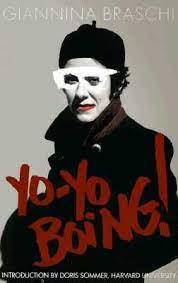

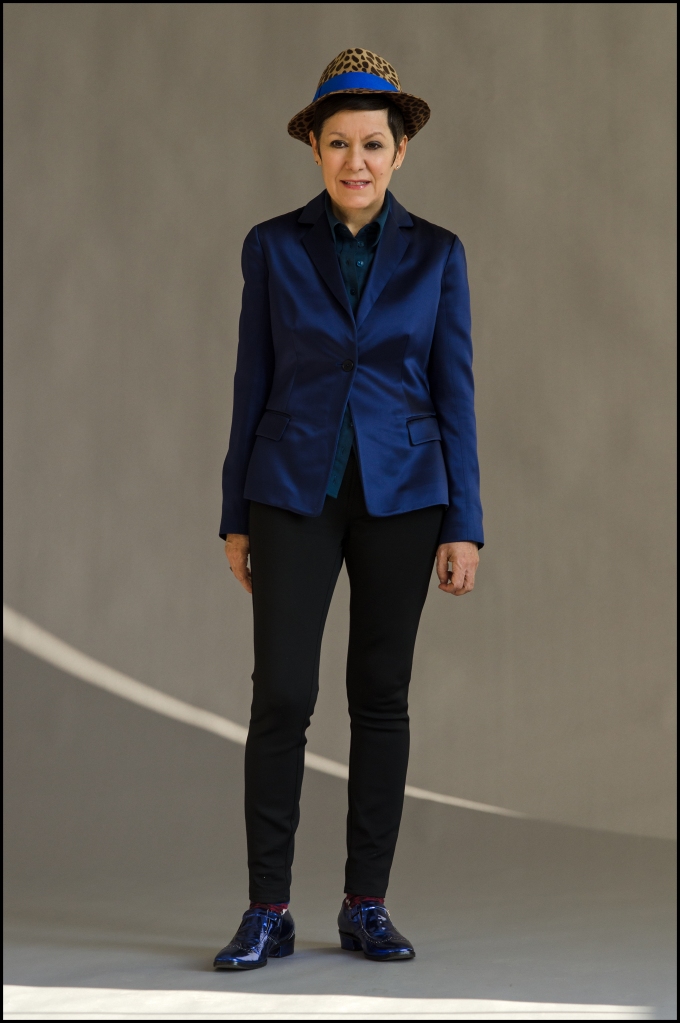
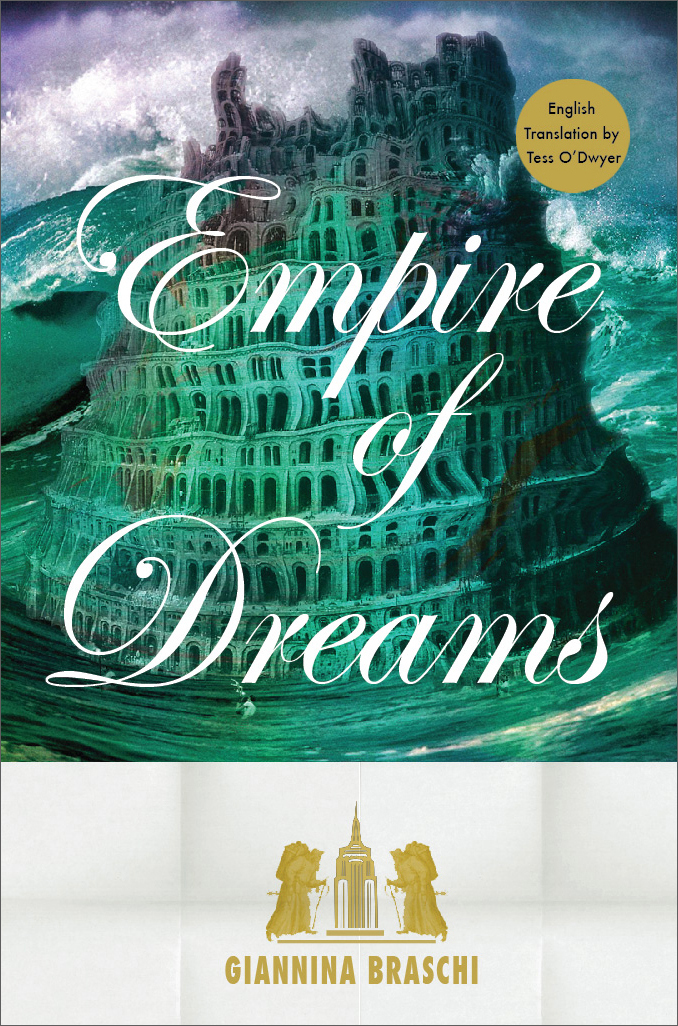
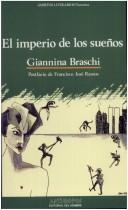

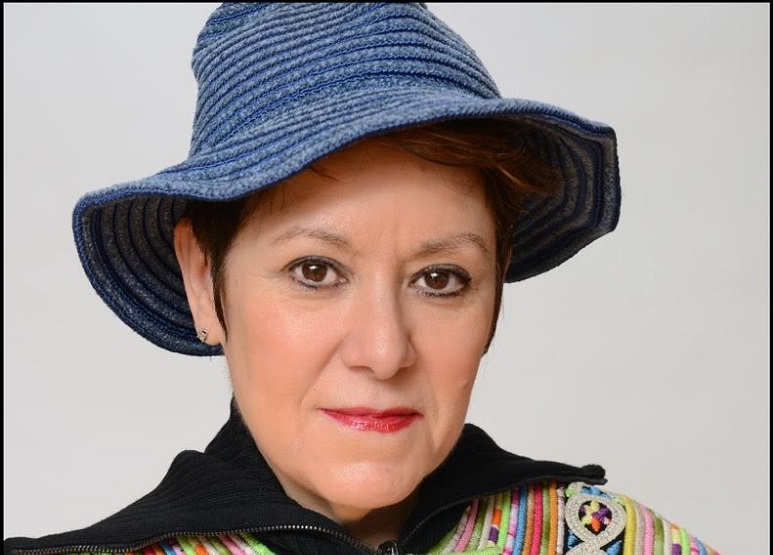







 Originalidad quiere decir volver al origen. Originalidad nace siempre del origen y Puerto Rico es una nación que no ha tenido nacimiento. La identidad no es mi problema. Siempre he estado identificada conmigo misma. No creo que los puertorriqueños tengan ningún problema con la identidad. Los puertorriqueños saben quiénes son a todos los niveles. Es un problema de origen.BERB: En tu obra hay una combinación de una experimentación lingüística junto a la corporeidad, a la escatología. Ese comienzo de “Yo-Yo Boing!” de esa mujer buscándose los orificios, sus excreciones y luego a hablar de lo que hace a un buen poeta ser poeta, lo que es bueno vs. lo que es grande. ¿Cómo hilas esas dos cosas que podrían parecer discordantes pero que en tu escritura no lo son?
Originalidad quiere decir volver al origen. Originalidad nace siempre del origen y Puerto Rico es una nación que no ha tenido nacimiento. La identidad no es mi problema. Siempre he estado identificada conmigo misma. No creo que los puertorriqueños tengan ningún problema con la identidad. Los puertorriqueños saben quiénes son a todos los niveles. Es un problema de origen.BERB: En tu obra hay una combinación de una experimentación lingüística junto a la corporeidad, a la escatología. Ese comienzo de “Yo-Yo Boing!” de esa mujer buscándose los orificios, sus excreciones y luego a hablar de lo que hace a un buen poeta ser poeta, lo que es bueno vs. lo que es grande. ¿Cómo hilas esas dos cosas que podrían parecer discordantes pero que en tu escritura no lo son?












